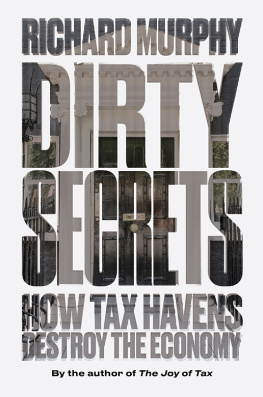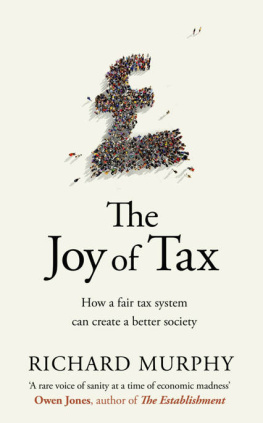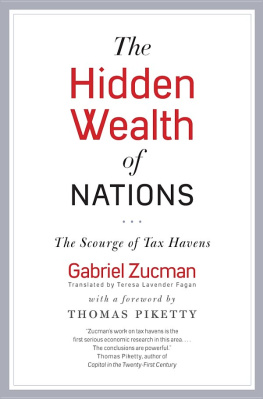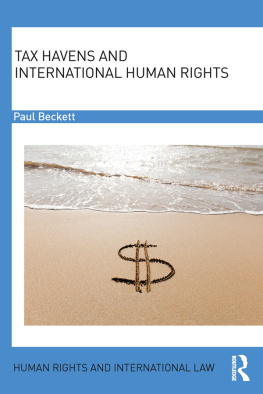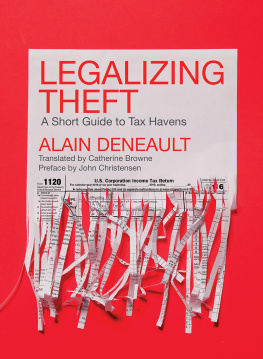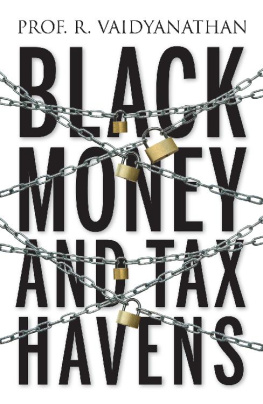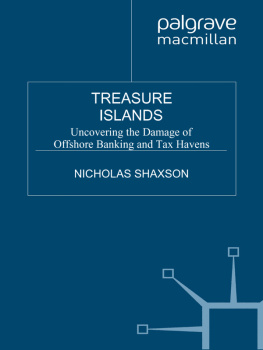This book was written as a response to the Panama Papers. It is not, however, a direct commentary upon those disclosures; nor does it draw upon them in any great detail. Instead, it offers an explanation as to why, almost twenty years after the worlds major nation-states began to take action against tax havens, and after a decade or more of civil-society campaigning on this issue, tax havens appear still to be prospering.
In my view, tax havens have three fundamental purposes: to undermine the rule of law for the benefit of an elite in society; to prevent democratically elected governments from delivering policies that their electorates might expect of them; and to increase the concentration of both income and wealth around the world. In all cases, these processes are undertaken behind a veil of secrecy that has been deliberately designed to prevent what is happening becoming apparent, while denying to those who need it whether within governments or markets the data required to make informed decisions.
In light of this, the reasons why we still have tax havens are fairly obvious. Firstly, governments and campaigners have been too focused on the issue of taxation, when the challenges that tax havens pose range over a much broader range of issues than that. Secondly, many politicians in major states have been unwilling to close down the abusive activities undertaken in tax havens when so many of those activities seem to be favoured by their sponsors, and can often be found, in varying degrees, within their own jurisdictions. Finally, politicians have not understood the scale of the threat tax havens represent to the way in which we live.
The consequences of that lack of political nous on their part are telling: the wave of political populism aimed at economic and political elites that is now sweeping through many countries is at least partly based on an awareness that tax havens threaten the well-being of most ordinary people, and that not enough is being done to stop the abuses they permit. It seems timely to ask why so many understand this fact, while politicians have remained neither willing nor able to do so.
Some of the abuse that tax havens permit is reflected in vast amounts of uncollected tax. Precisely how much it amounts to remains unknown, because far too many countries refuse to calculate their tax gaps, which are a measure of how much tax they do not collect, and why. Even if it is not the whole story of tax havens, the issue of uncollected tax is important: tax abuse has left too many developing countries dependent upon aid when they should have the right to set their own priorities, which they would be able to do if they collected the tax that is rightfully theirs.
In developed countries, that shortage of revenue has been used as an excuse to impose austerity that has blighted the lives of millions of people, leaving them in poverty while elites have seen their wealth soar, partly because they hold at least some of it offshore, and thus free of taxation. When even the International Monetary Fund (IMF), the World Bank, and the Organisation for Economic Cooperation and Development (OECD), none of which is considered a hotbed of socialism, recognise the threat to economic growth, popular well-being and political stability represented by this growing inequality, the pressing need for major reform of tax practices to collect the missing billions is clear.
The issue is bigger than this, though. In a world where almost every economy can be described as mixed the state and private sectors combining in various ways to meet the needs of a domestic population it is important for everyone that markets should work as well as they can. As every economist should know, there are some important conditions that must be met if this is to happen. These include the provision of as much data as possible to market participants, so that decision-makers whether they be businesses, investors, employees, regulators, governments or others can make the best possible decisions on how resources are used. They also include a requirement that there be a level playing field on which people have equal access to capital, so that those with good ideas can bring them to market. By deliberately creating opacity and concentrating the ownership of wealth, tax havens undermine these two conditions, thus inhibiting fair competition and growth. It is not by chance, then, that the worlds economy is stagnating: the growth of tax havens in the last three decades has made this outcome almost inevitable. If markets are to contribute to our well-being as they should, then they must be saved from the curse of tax havens.
Democracy, too, stands in need of salvation. A close examination of tax havens reveals their role in the deliberate promotion of regulations that are of little or no benefit to their own populations. Instead, such measures are designed to undermine the ability of other governments to impose the regulations they have created in response to the mandate conferred on them by their electorates. Tax law is one type of such regulation, but others are also undermined. These include competition law, environmental regulation, accounting rules, employment law, gambling regulation, laws on inheritance and property ownership, and a great deal more.
Those who use tax havens and the professionals who help them want to live in a world where the law does not apply to them, but constrains the actions of everyone else. The clear success they have had in achieving this aim has damaged confidence in the ability of governments to deliver on their promises, leading to a decline in voter participation and increasing calls for alternative, extra-parliamentary solutions to political problems. This process is massively destabilising for what most consider the normal way of life across large parts of the world. But such instability is far from accidental: tax havens and their clients intend this outcome, and far too little is being done to address it.
As I suggest in this book, the measures taken to tackle tax haven abuse mainly through coordinated action by the OECD, but also by the European Union, the IMF and individual governments have so far been inadequate. In too many cases, it appears as if the option of failure was from the outset built in to the measures supposedly intended to tackle abuse. The result has been a combination of great political heat with relatively little real change in how tax havens have operated. This might represent an argument for pessimism, and even a belief that reform is not possible. I do not share that view. One of my primary purposes in writing this book is to outline viable reforms that could shake tax havens to their foundations.

